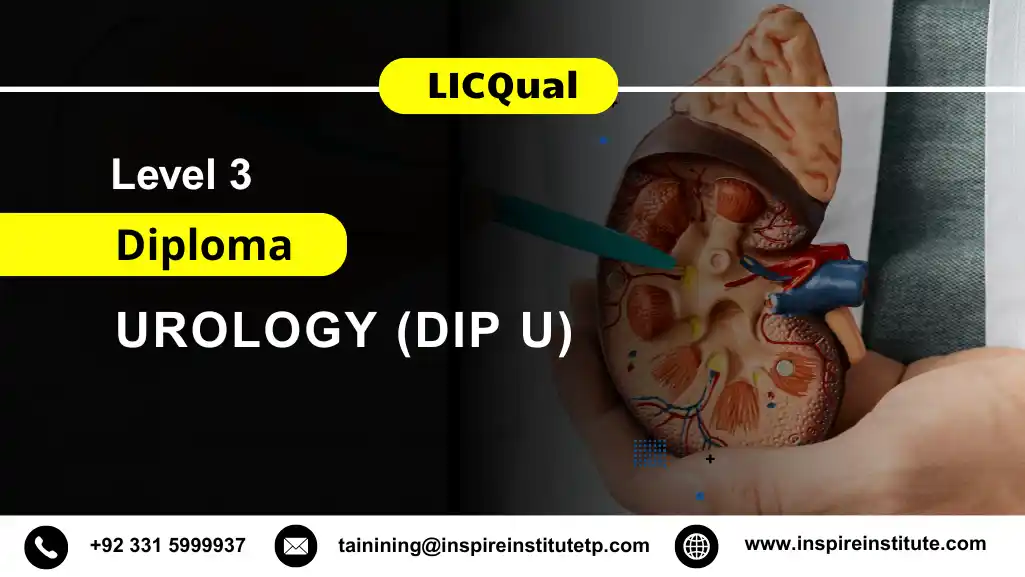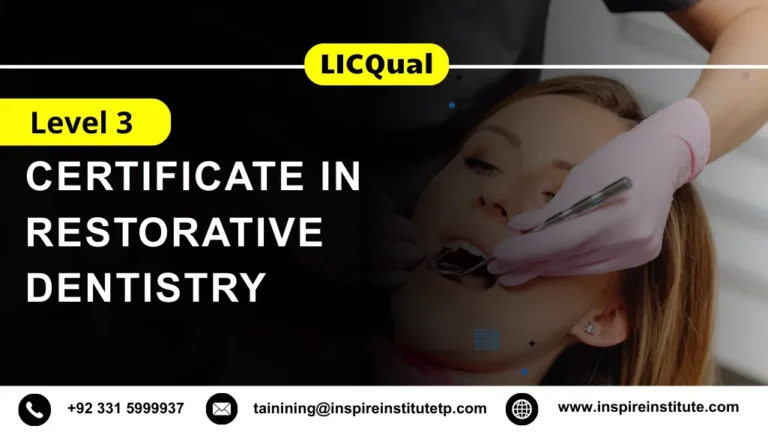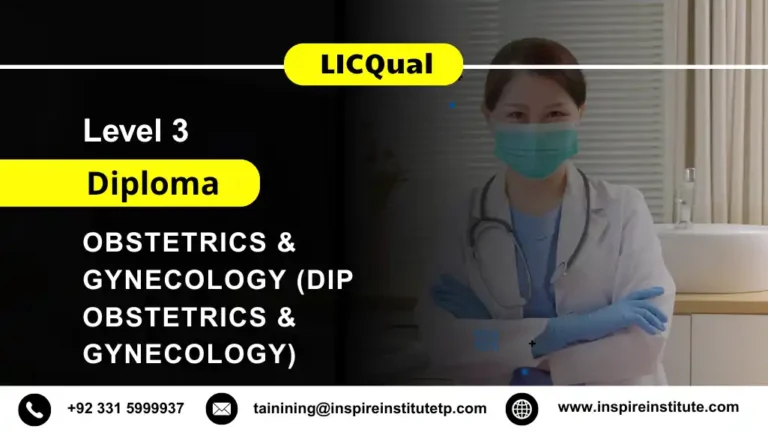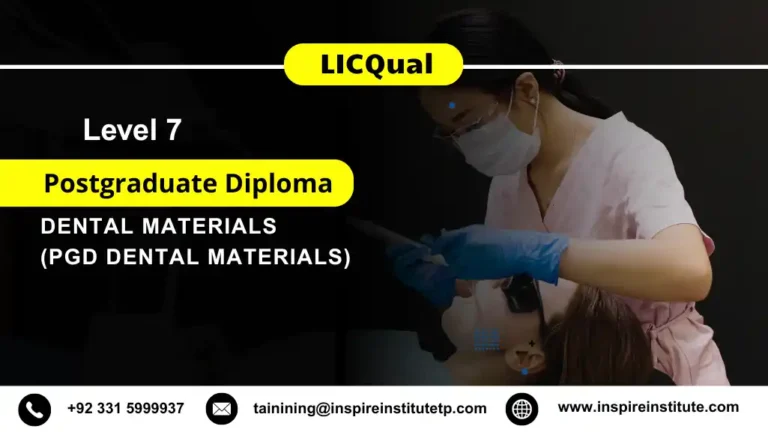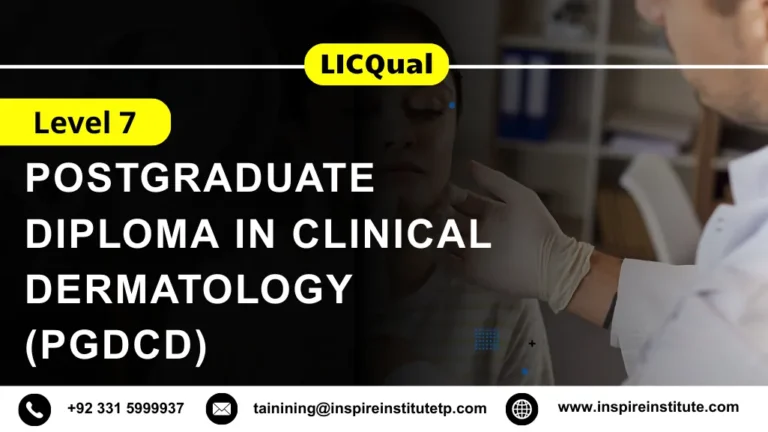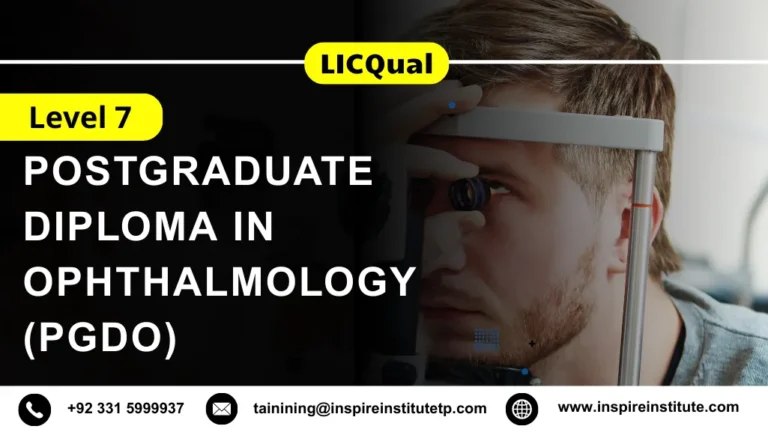LICQual Level 3 Diploma in Urology (Dip U)
The LICQual Level 3 Diploma in Urology (Dip U) is a specialized qualification designed for healthcare professionals and aspiring practitioners seeking to build expertise in the diagnosis, treatment, and management of urological disorders. Urology is a vital field of medicine that addresses the health of the urinary system and male reproductive organs, making this diploma an excellent pathway for learners who want to advance in patient-centered medical care.
This diploma provides a comprehensive understanding of urological anatomy, physiology, and common conditions such as urinary tract infections, kidney diseases, bladder disorders, and prostate health. Learners gain insight into preventive healthcare strategies, diagnostic procedures, and evidence-based treatments that improve patient outcomes in both clinical and community settings.
Through the LICQual Level 3 Diploma in Urology (Dip U), students develop practical skills essential for conducting patient assessments, interpreting diagnostic tests, and supporting medical teams in delivering effective urological care. The curriculum combines theoretical knowledge with real-world applications, ensuring graduates can contribute confidently in hospitals, clinics, and specialized urology departments.
One of the key strengths of this course is its assignment-based structure, allowing learners to progress at their own pace while balancing personal and professional commitments. This flexibility makes the diploma accessible to healthcare assistants, nursing staff, medical students, and individuals seeking to expand their career opportunities in urology and general healthcare.
Graduates of this programme earn a UK-recognised qualification, boosting employability and professional credibility on both national and international levels. The LICQual Level 3 Diploma in Urology (Dip U) also serves as a strong foundation for further studies in medicine, nursing, and specialized healthcare pathways.
By completing this diploma, learners not only strengthen their medical knowledge but also enhance their ability to make a meaningful difference in patient care. With its focus on skill development, ethical practice, and global recognition, the LICQual Level 3 Diploma in Urology (Dip U) is an excellent step toward advancing in the ever-evolving field of healthcare.
Why Choose this Qualification
The LICQual Level 3 Diploma in Urology (Dip U) is a specialized qualification designed to build essential knowledge and skills for those aspiring to work in urological healthcare. Urology is a vital medical field focusing on the diagnosis, treatment, and management of urinary system disorders and male reproductive health. Choosing this diploma strengthens both academic and professional expertise while preparing learners for impactful roles in hospitals, clinics, and community healthcare.
Key Reasons to Choose this Qualification
Comprehensive Understanding of Urology
- Gain a solid foundation in urological anatomy, physiology, and urinary system health.
- Learn about common urological conditions such as urinary tract infections, kidney diseases, and bladder disorders.
- Explore male reproductive health, including prostate care and infertility issues.
- Understand preventive healthcare practices to manage and reduce urological risks.
Practical Skills for Real-World Healthcare
- Develop hands-on skills to assess, diagnose, and monitor urological patients effectively.
- Learn procedures for handling common urological emergencies and complications.
- Apply evidence-based practices in treating acute and chronic urological conditions.
- Strengthen critical thinking and clinical decision-making skills through case scenarios.
Career-Ready Qualification
- Enhance employability with recognized urological healthcare knowledge.
- Prepare for entry-level roles in hospitals, specialized clinics, and diagnostic centers.
- Build a strong foundation for advancing into higher-level medical and nursing studies.
- Gain professional competence validated by an internationally accredited qualification.
Strong Focus on Patient-Centered Urological Care
- Learn effective communication strategies for engaging with patients and families.
- Apply empathy and ethical practices in urological healthcare delivery.
- Understand cultural and social factors influencing urinary and reproductive health.
- Gain confidence in supporting patients through treatments and rehabilitation.
Internationally Recognized Qualification
- Earn a diploma awarded by LICQual, known for academic and healthcare excellence.
- Unlock opportunities for global careers in urology and allied healthcare sectors.
- Gain recognition and credibility among employers, medical peers, and professional bodies.
- Use this qualification as a pathway to advanced certifications and medical specialization.
Flexible and Structured Learning
- Study a structured curriculum tailored to progressive skill development.
- Learn at your own pace with assignment-based assessments for deeper understanding.
- Access study materials and resources aligned with urological healthcare.
- Balance academic growth with personal and professional responsibilities.
Ethical and Professional Development
- Understand professional codes of conduct specific to urology and patient safety.
- Learn about patient confidentiality, consent, and safeguarding policies.
- Develop ethical reasoning in managing complex urological healthcare challenges.
- Build leadership qualities for career advancement within healthcare.
Contribution to Healthcare and Society
- Play a vital role in improving urinary and reproductive health outcomes.
- Support community initiatives for awareness and early detection of urological conditions.
- Build a career that delivers both professional recognition and personal fulfillment.
- Contribute to reducing the burden of urological diseases through skilled healthcare practice.
The LICQual Level 3 Diploma in Urology (Dip U) goes beyond academic learning—it is a gateway to professional growth and healthcare excellence. With its blend of theoretical depth, practical training, ethical focus, and global recognition, this diploma equips learners to make a meaningful difference in urological medicine. By pursuing this qualification, you are investing not only in your career but also in advancing patient care and public health worldwide.
Course Overview
LICQual UK Awarding Body
Average Completion Time:
4-12 Months
Study Units: 6 Units
Evidence & Assignment Based
Mandatory Units
Who Should Take This Course
The LICQual Level 3 Diploma in Urology (Dip U) is a specialized qualification designed for individuals passionate about advancing their knowledge in urinary tract health, kidney function, and male reproductive medicine. Urology is a vital branch of healthcare that requires both scientific understanding and practical application. This diploma equips learners with the expertise needed to begin or enhance a career in healthcare while also serving as a strong pathway to higher-level studies. With its assignment-based structure and internationally recognized standards, the programme is suitable for a diverse range of learners.
This Course is Suitable For
Aspiring Urology and Healthcare Professionals
- Build a comprehensive understanding of urinary system anatomy, physiology, and common disorders.
- Learn to identify and manage conditions such as urinary tract infections, kidney stones, and bladder issues.
- Develop essential skills to assess, diagnose, and monitor urological health effectively.
- Gain confidence in applying urological medical knowledge in hospitals and clinical practice.
Nursing and Healthcare Assistants
- Enhance expertise in patient care specific to urological conditions.
- Improve hands-on skills in monitoring vital signs and assisting in urological procedures.
- Strengthen communication abilities for supporting patients with sensitive health concerns.
- Acquire an internationally recognized diploma to progress within nursing and healthcare careers.
Medical Students and Early Career Practitioners
- Use this diploma as a strong academic foundation for advanced urology or general medical studies.
- Gain early exposure to diagnostic tools, treatment approaches, and ethical practices in urology.
- Develop evidence-based clinical skills to apply in patient-centered care.
- Strengthen problem-solving and decision-making abilities in complex urological cases.
Allied Health Professionals
- Broaden professional expertise to contribute effectively within multidisciplinary healthcare teams.
- Learn preventive approaches to reduce risks of kidney and urinary tract conditions.
- Improve patient care delivery with applied knowledge of male reproductive health.
- Enhance career value by integrating specialized urology knowledge into existing healthcare roles.
Community Health Workers and Caregivers
- Acquire the knowledge needed to support patients with urinary and reproductive health concerns.
- Learn to identify early warning signs of kidney or bladder-related illnesses.
- Promote preventive healthcare practices within local communities.
- Strengthen ability to educate individuals and families on maintaining urological health.
Individuals Seeking a Career Change into Healthcare
- Begin a new career path in healthcare through a recognized international qualification.
- Gain specialized knowledge in urology without requiring prior medical training.
- Acquire transferable healthcare skills for roles in hospitals, clinics, and NGOs.
- Build confidence to pursue further education or higher-level qualifications in medical fields.
International Learners Aiming for Global Healthcare Careers
- Earn a diploma accredited by LICQual, recognized across international healthcare sectors.
- Gain globally relevant knowledge in urology, meeting professional healthcare standards.
- Strengthen employability for roles in hospitals, clinics, and diagnostic centers worldwide.
- Open pathways to advanced studies and specialized medical certifications abroad.
Volunteers and NGO Workers in Health and Community Programs
- Acquire practical knowledge for contributing effectively to health and wellness projects.
- Learn the essentials of urology relevant to outreach and community-based health initiatives.
- Improve ability to support reproductive and urinary health awareness campaigns.
- Make a meaningful impact in improving public health outcomes through skilled practice.
The LICQual Level 3 Diploma in Urology (Dip U) is ideal for anyone determined to contribute to urological healthcare and patient well-being. Whether you are an aspiring professional, a practicing healthcare worker, or someone exploring a new career path, this qualification provides the foundation, applied skills, and global recognition necessary to succeed in the specialized field of urology. By choosing this diploma, learners prepare themselves for a career that combines scientific expertise with patient-centered impact.eer advancement and the opportunity to make a meaningful contribution to the future of children’s healthcare.
Course Benefits
The LICQual Level 3 Diploma in Urology (Dip U) provides significant benefits for learners seeking to build specialist knowledge in urinary health, kidney function, and male reproductive medicine. By combining essential theoretical understanding with practical applications, this diploma equips students with the skills to deliver high-quality patient care, diagnose and manage common urological conditions, and support preventive health strategies. Designed as a flexible, assignment-based programme, it promotes both professional development and academic excellence, ensuring relevance in today’s evolving healthcare sector.
Key Benefits of the Course:
- Specialist Knowledge: Gain a strong foundation in urinary system anatomy, renal physiology, and male reproductive health. Learners explore common and acute urological conditions such as urinary tract infections, kidney stones, prostate disorders, and bladder dysfunction. The programme also emphasizes preventive strategies, urological diagnostics, and ethical practices, enabling learners to make informed, evidence-based decisions in clinical care.
- Practical Application: Develop hands-on skills to assess urinary health, recognize symptoms of renal and bladder conditions, and support early diagnosis. Learners gain practical competence in assisting with urological procedures, administering basic treatments, and applying patient-centered care in hospitals, clinics, and community settings. This ensures that graduates can apply theory directly to real-world urological healthcare challenges.
- Recognised Qualification: Earn a UK-accredited diploma that validates advanced knowledge in urology and strengthens professional credibility. The qualification aligns with international healthcare standards, making it highly valuable for careers in hospitals, diagnostic centers, urology clinics, NGOs, and community healthcare institutions worldwide.
- Flexible Learning Pathway: Benefit from an assignment-based study model that allows learners to balance professional or personal commitments while advancing academically. This flexible approach makes the LICQual Level 3 Diploma in Urology (Dip U) an ideal option for healthcare assistants, medical students, and career changers seeking a structured yet accessible programme.
- Evidence-Based Training: Explore the latest medical guidelines in urological care, diagnostics, and preventive medicine. Training emphasizes safe, effective, and evidence-driven healthcare interventions, including kidney health monitoring, prostate care, and urinary system management, ensuring graduates adopt modern best practices in urological medicine.
- Career Development: Expand career opportunities across hospitals, urology clinics, diagnostic centers, research institutions, and international healthcare organizations. The diploma opens pathways to roles in urological care support, clinical assistance, and allied medical services, as well as progression to higher-level studies in medicine, nursing, and healthcare sciences.
- Enhanced Patient Care Delivery: Contribute to improved patient outcomes by supporting early detection, accurate diagnosis, and effective management of urological conditions. Learners acquire the skills to support patients sensitively, promote wellness, and address healthcare challenges, ultimately improving community health and quality of life.
- Professional Growth: Strengthen clinical knowledge, problem-solving, and decision-making skills essential for working in urology. The course also develops professional values such as empathy, ethics, and effective communication, preparing learners to collaborate with healthcare teams and play a vital role in specialized patient care.
The LICQual Level 3 Diploma in Urology (Dip U) equips learners with essential knowledge, practical expertise, and an internationally recognised qualification. It empowers healthcare professionals and aspiring practitioners to advance their careers, contribute to public health initiatives, and make a meaningful impact in the specialized field of urology. impactful field of pediatric medicine.
Eligibility Criteria
The LICQual Level 3 Diploma in Urology (Dip U) is a UK-accredited programme designed for aspiring healthcare professionals, nurses, medical assistants, and allied health practitioners who want to develop a strong foundation in urological medicine and patient care. This assignment-based qualification blends essential theoretical knowledge with practical applications, making it ideal for medical students, healthcare assistants, and individuals looking to specialize in urinary health, kidney function, and male reproductive medicine. By meeting the entry requirements, learners position themselves for academic success and career advancement in hospitals, clinics, diagnostic centers, and community healthcare settings.
Educational Background:
Applicants should hold a recognised healthcare or science-related qualification such as a diploma in healthcare practice, nursing, or an equivalent field. Candidates with Level 2 or Level 3 qualifications in healthcare, clinical sciences, or related subjects may also be considered. International qualifications will be reviewed individually to ensure they meet the academic standards required for the programme.
Professional Experience:
Previous experience in healthcare or clinical practice is beneficial but not strictly mandatory. A minimum of one year of healthcare, caregiving, or medical assistance experience is recommended. Applicants with prior exposure to urology, renal health, or general patient care will find the course particularly advantageous. However, motivated learners without direct experience are also encouraged to apply.
Age Requirement:
Learners must be at least 18 years of age at the time of enrolment. This ensures that candidates have the maturity, responsibility, and commitment necessary for engaging effectively with both the academic and practical elements of the urology diploma.
Language Proficiency:
Since the programme is delivered in English, applicants should demonstrate strong reading, writing, and communication skills. For non-native English speakers, a minimum IELTS score of 6.0 or an equivalent qualification is recommended. This ensures learners can successfully complete assignments, access course resources, and communicate professionally in clinical and academic contexts.
Technical Requirements:
Applicants should have reliable access to a computer or laptop with a stable internet connection. Basic IT skills are essential for navigating online learning platforms, conducting research, and submitting assignments. Familiarity with word processing tools and digital study resources will further support an efficient learning experience.
Required Documents:
Applicants are required to submit a valid ID or passport, proof of educational qualifications, and evidence of relevant healthcare or professional experience (if applicable). Candidates with international qualifications may need to provide additional documentation for verification to ensure alignment with UK academic and professional standards.
The Qualification Process
LICQual Level 3 Diploma in Urology (Dip U) follows a structured pathway to ensure learners gain comprehensive knowledge, practical skills, and professional competence in community oral healthcare.
Step 1: Self-Assessment
Learners review the entry requirements to confirm eligibility. Candidates with a background in dentistry, oral health, or public health are encouraged to apply.
Step 2: Registration
Complete the registration process by submitting required documents such as proof of qualifications, a valid ID, and payment of enrollment fees.
Step 3: Induction
An induction session is conducted to:
- Verify learner eligibility and documentation.
- Introduce study materials, learning outcomes, and assessment procedures.
Step 4: Learning and Evidence Submission
Learners complete assignments, case studies, and practical exercises demonstrating competence in public health dentistry, community oral health assessment, preventive strategies, and program planning.
Step 5: Feedback and Revision
Assessors review submitted evidence and provide constructive feedback. Learners can revise and resubmit work to meet all required standards.
Step 6: Competence Validation
Final submissions are evaluated to confirm that learners have met all theoretical and practical learning outcomes.
Step 7: Internal Quality Assurance (IQA)
The IQA team reviews the assessment process to ensure accuracy, fairness, and compliance with international standards.
Step 8: External Verification (EQA)
External verifiers validate the authenticity and quality of learner achievements.
Step 9: Certification
Upon successful verification, learners are awarded LICQual Level 3 Diploma in Urology (Dip U),demonstrating advanced proficiency in community oral healthcare and preparing them for professional growth in dental public health, preventive dentistry, and healthcare policy.

